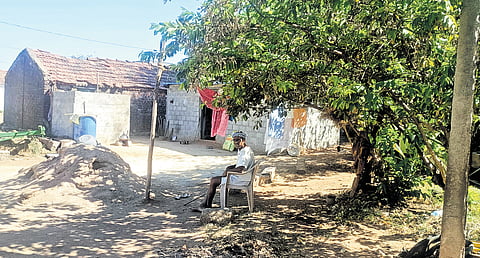

HANAMKONDA : Once a hub of illicit liquor, Ratnagiri tanda in Bheemadevarapalli mandal is now a living example of what transformation looks like. A community once bound by necessity, is now unbound by opportunity. The seeds of change, sown in the fields of education, have blossomed into a generation of government employees, a ripple effect that transformed a village.
Just two decades ago, this tribal hamlet survived by brewing illicit liquor. At least one member of each family used to be involved in the illicit liquor trade. However, a ban on liquor in the past brought about change. Today, around 25 Scheduled Tribe (ST) families have found a stable livelihood through dairy farming. Each family earns between Rs 15,000 and Rs 18,000 per month by selling milk. Not just improvement in their lives, now, at least one member from each family has secured employment in government organisations, serving in urban areas across Telangana.
Speaking to TNIE, a resident, Banoth Raju, says, “During the tenure of NT Rama Rao as chief minister of undivided Andhra Pradesh, almost every family in the village was involved in illicitly distilled liquor production for survival.”
Banoth Raju, also known as Pedda Raju, has two sons who are government employees. His elder son, Dr Deshai Kumar, works in a government hospital and recently completed his MD in paediatrics in Chennai. His second son, Ashok Raj Singh, is employed in a bank, while his son-in-law is an assistant engineer in Hyderabad.
“At that time, when he imposed a liquor ban, we initially saw it as a setback. However, over the years, government policies changed, and we received support through various welfare schemes. We shifted our focus to dairy farming and agriculture, which provided us with a sustainable livelihood. Recognising the importance of education, we ensured our children received quality schooling.
Today, around 75 children from our tanda have studied in different schools and secured government jobs. Although they are now settled in urban areas, we, as parents, continue to live a comfortable life here in the tanda,” says Raju.
While the elderly continue to reside in Ratnagiri tanda, their children are employed in government services in Hanamkonda, Hyderabad, Karimnagar, Siddipet and Jagtial.
When TNIE visited the hamlet, 70-year-old Banoth Redya was found sitting in front of his house. “My daughter, Srilatha, has been working as a government schoolteacher in an urban area for 15 years. I have three children — two are in government jobs and one is employed in the private sector. All of them have settled in urban areas. My wife and I continue farming and cattle rearing for our livelihood, earning approximately `15,000 per month through milk sales and additional income from agriculture,” he says.
Redya’s three brothers also ensured that their children received a proper education. They studied in places like Vangara, Hanamkonda and Karimnagar, and after completing higher education, they secured government jobs.